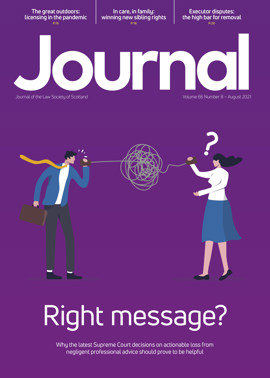Licensing the great outdoors

One of the features of life as a licensing lawyer since lockdown struck in March 2020 has been grappling with a significant cohort of temporary arrangements for the use of hospitality facilities in the great outdoors. As bars, pubs and restaurants have railed against the fettering of their trading abilities by activating external space, in many cases just to keep their business afloat and staff in paid employment, it is fair to say that the related law has perpetuated in flux.
We all remember the sheer delight for the trade, and their customers, when beer gardens reopened in the summer of 2020. Since that time these arrangements have continued to highlight (in some cases) very disparate views, especially as to what some might refer to as the “use and abuse” of occasional licences – temporary licences which can be obtained under the Licensing (Scotland) Act 2005, and which are most commonly associated, especially now, with outdoor facilities.
However, the use of occasional licences was a hot topic pre-COVID. Back in 2010 the ability was given to Parliament (see s 13 of the Alcohol etc (Scotland) Act 2010) to create additional rules surrounding occasional licences by way of regulation; no such regulation has appeared. On 23 April 2019, the Scottish Government released a mini-consultation on this issue, which specifically sought views on whether there should be limits introduced in relation to the duration of an individual occasional licence, or limits on overall numbers issued.
The law of occasional licences
The 2005 Act allows the use of one occasional licence up to a maximum of 14 days. However, it is historic convention since the days of the Licensing (Scotland) Act 1976 that these licences can be run consecutively, thus creating a longer pattern of trading. Typically, occasional licences are used for very short, specific events such as festivals, or celebratory events such as weddings and so on. But they are also used in this “back to back” fashion to allow premises to trade in outside areas across long parts of the year.
Occasional licences are used where a premises has obtained a provisional licence and is awaiting the formal confirmation of that licence, and they are also used in advance of provisional or full premises licences being granted, in some cases allowing a premises to trade for many months under these temporary licences. These examples are widespread across all licensing board areas, with few exceptions.
The 2005 Act does not require that there be “an event” in order for an occasional licence to be sought. Notwithstanding that, some licensing boards have imposed this as an expectation, or even black and white rule, as a part of their local licensing policies. It should be noted that there are special rules which apply to members’ clubs – but for the purposes of this article I am focusing on outdoor spaces.
The 2019 consultation outcomes
In the lead-up to the April 2019 consultation, some raised concerns that the use of consecutive occasional licences was a circumvention of the licensing regime.
The consultation sought views on the unused powers introduced in 2010, such as applying limits to the number of licences one applicant could seek, how many could apply to the same set of premises in a 12-month period, and so on. The consultation attracted a large number of responses, including views such as:
- concern over the availability of alcohol;
- should be for short term use only;
- limits could interfere with mobile bar businesses;
- limits could mean local businesses withdrawing support of community events;
- longer term use of occasional licences is unfair on permanent premises;
- ease of obtaining occasional licences “normalises” alcohol consumption.
No further action was taken, so these views have sat on the shelf since 2019. Of course, in March 2020 the world changed, so if there had been any legislative outcomes from the consultation in the pipeline, they were trapped in the licensing phantom zone.
Lockdown – and the rise of outdoor spaces
As we entered early summer 2020, it became apparent that the risk factors in transmission of the virus were markedly different in outside spaces. In June of that year, the Scottish Government issued a formal update to the Guidance to Licensing Boards under s 142 of the 2005 Act, encouraging boards to look creatively at applications for occasional licences to support outdoor hospitality.
Outdoor spaces such as beer gardens were then allowed to reopen as of 6 July, subject to licensing permission. The Chief Planner confirmed, at the same time, that temporary structures or use of land to provide outdoor hospitality would not need planning permission and that the typical 28 day rule – the maximum a space can be used without needing permission – should be ignored.
Finally, on 13 July, the then Housing Minister, Kevin Stewart MSP, issued a letter confirming that building regulations in relation to temporary structures for outdoor hospitality provision were also relaxed, meaning such structures would not require building warrant approval.
The result of all of this was an explosion of applications for occasional licences for areas that hitherto had never been used for outdoor hospitality: pub car parks, private land, pavement areas, rear courtyards and other pop-ups. Licensing boards up and down the country reacted incredibly, many creating bespoke or streamlined processes to support their licensees getting up and running again. Licensing standards officers and Police Scotland also responded in kind, doing their best to cope with the statutory reporting processes for the hundreds of such applications lodged all over Scotland. In my own experience, I think almost all of the proposals I was asked to deal with were supported and granted, with just a very few exceptions.
Adjusting to new facilities
So we now had a large number of outdoor spaces which had never been used before, such as the temporary tents up and down Aberdeen’s Union Street. It is perhaps no stretch to imagine that, in some cases, these facilities had detractors. Areas which would never have been given a licence pre-pandemic, were now licensed. In some cases, local residents or other businesses were unhappy, although it should also be said for balance that many supported the use of the areas to help steer their local pubs and bars through the hard times.
As the months moved on, there were far ranging conversations amongst the higher-ups in local authorities about the concept of “place” and the commercial use of public spaces. We also saw a few high profile cases where such areas attracted media attention – perhaps the most famous being the Draft Project, a pop-up outside bar facility adjacent to Aberdeen’s Soul club venue. There were scenes of great jubilation after David Marshall’s heroics in goal against Serbia to send Scotland to Euro 2020 (2021!), allegedly in breach of social distancing rules. As the area was being traded from consecutive occasional licences, the next one due to be issued was taken to hearing to allow the licensing board to explore the concerns,
and ultimately granted.
Consecutive occasional licences: Keasim Ltd v City of Glasgow Licensing Board
There is so much more which could be said about the interaction of the neverending iteration of coronavirus regulations and how this impacted the licensed trade generally, as well as in relation to outdoor spaces, but the Draft Project example brings me back to the consecutive use of occasional licences.
This dark corner of licensing law is on the verge of benefitting from some judicial light. We are imminently to have the written reasoning of Sheriff Reid in the case of Keasim Ltd v City of Glasgow Licensing Board, unreported to date, but decided in favour of the appellant on 8 June 2021. I believe this may have been the first appeal in relation to an occasional licence under the 2005 Act, so it is a decision of some interest to the licensing community.
The case surrounds the refusal of consecutive occasional licences for an outdoor hospitality facility known as Festival Village, in the Candleriggs area of Glasgow. Issues amongst the pleadings included whether an “event” is needed to justify an occasional licence, and whether consecutive use over some months was circumvention of procedure. Sheriff Reid quashed the refusals and ordained the board to grant the licences, with his reasoning to follow. Examination of that reasoning has evaded the deadline for this article, but will no doubt be ventilated in conferences and seminars once available.
Finally, it is worth noting that the temporary waivers in relation to planning and building regulations look set to extinguish in March 2022. Licensing lawyers and planning advisers alike are urging clients to liaise with their local authorities now, so that those who wish to retain such facilities on a more permanent basis have the appropriate consents in place.
Regulars
Features
Briefings
- Criminal court: Sentencing deconstructed
- Family: Litigation and lottery wins
- Human rights: Reinforcing the right to be forgotten
- Pensions: Plugging the LGPS exit credit hole
- Criminal law: The future of sexual offence trials
- Scottish Solicitors' Discipline Tribunal
- Property: Heat networks: the key to low-carbon heating?
- In-house: Power of the nudge







